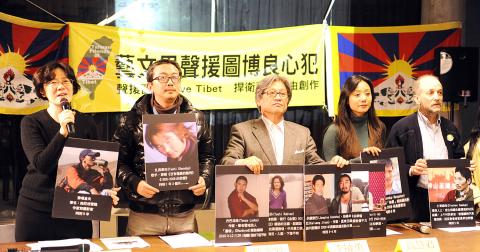Writers, musicians, an environmentalist and a student yesterday voiced their support for about 20 Tibetans arrested in recent years for their opposition to the Chinese occupation of Tibet.
“We may speak different languages, but we share a common language, which is ‘freedom,’” rapper and songwriter Chang Jui-chuan (張睿詮) told a press conference in Taipei to support Tibetan musicians, writers, filmmakers and artists arrested in China.
“We may believe in different religions, but we share one common faith — this is ‘human rights,’” Chang said.

Photo: George Tsorng, Taipei Times
Following an uprising in Tibet in 2008, the Chinese government launched a series of arrests across China that continues to this day.
The plights of the 20 Tibetans highlighted at the press conference include those of musician Tashi Dhondup, filmmaker Dhondup Wangchen and environmentalists Rinchen Samdup and Karma Samdup.
A well-known local singer in Henan Province, Tashi Dhondup released Tibetan albums The Year of 1959 in 2008 and Torture Without Trace last year — both expressing Tibetans’ nostalgia for the Dalai Lama and the suffering endured under Chinese rule.
He was detained in December for producing what Chinese authorities called “counterrevolutionary music.”
Dhondup Wangchen was arrested not long after the release of a film documenting views from ordinary Tibetans on the Olympic Games in Beijing in 2008 and was sentenced to six years in prison.
“We should condemn any country in which there are prisoners of conscience. Tibetans have the right to speak their minds and should not be arrested over things they say,” poet Lee Min-yung (李敏勇) said.
“Although China is rapidly developing, it’s still not a civilized country and it could never win respect from the world if it continues to repress freedom of expression,” Lee said.
Freddy Lim (林昶佐), lead vocalist of the metal band Chthonic said he was saddened at the thought that Tibetan musicians had to live in fear of being arrested for their art.
“I’m going to work on some new songs after the press conference and won’t have to worry. They are supposed to enjoy the same rights as I do,” he said.
Paicu Yatauyungana, a singer of the Aboriginal Tsou tribe better known as Kao Hui-chun (高慧君), said she came out to support the Tibetans because both Tibetans and Taiwanese Aborigines are oppressed peoples.
“Aborigines in Taiwan and Tibetans are all original inhabitants of their native lands, but we have both been exploited when a modern state came into our domains,” she said.
“It’s tragic that the people cannot feel relaxed while singing a song, and life is in shadow. The people cannot write articles without fear,” Yatauyungana said.
In related news, to commemorate the 52nd anniversary of the Tibetan uprising against Chinese rule in 1959, Tibetan activist groups will organize a march in Taipei beginning at 2pm tomorrow from the Zhongxiao Fuxing MRT station to Taipei 101.
A candlelight vigil remembering those who died during the 2008 uprising will be held at Liberty Square in Taipei starting at 7pm on Monday.

Taiwanese can file complaints with the Tourism Administration to report travel agencies if their activities caused termination of a person’s citizenship, Mainland Affairs Council Minister Chiu Chui-cheng (邱垂正) said yesterday, after a podcaster highlighted a case in which a person’s citizenship was canceled for receiving a single-use Chinese passport to enter Russia. The council is aware of incidents in which people who signed up through Chinese travel agencies for tours of Russia were told they could obtain Russian visas and fast-track border clearance, Chiu told reporters on the sidelines of an event in Taipei. However, the travel agencies actually applied

New measures aimed at making Taiwan more attractive to foreign professionals came into effect this month, the National Development Council said yesterday. Among the changes, international students at Taiwanese universities would be able to work in Taiwan without a work permit in the two years after they graduate, explainer materials provided by the council said. In addition, foreign nationals who graduated from one of the world’s top 200 universities within the past five years can also apply for a two-year open work permit. Previously, those graduates would have needed to apply for a work permit using point-based criteria or have a Taiwanese company

The Shilin District Prosecutors’ Office yesterday indicted two Taiwanese and issued a wanted notice for Pete Liu (劉作虎), founder of Shenzhen-based smartphone manufacturer OnePlus Technology Co (萬普拉斯科技), for allegedly contravening the Act Governing Relations Between the People of the Taiwan Area and the Mainland Area (臺灣地區與大陸地區人民關係條例) by poaching 70 engineers in Taiwan. Liu allegedly traveled to Taiwan at the end of 2014 and met with a Taiwanese man surnamed Lin (林) to discuss establishing a mobile software research and development (R&D) team in Taiwan, prosecutors said. Without approval from the government, Lin, following Liu’s instructions, recruited more than 70 software

Chinese spouse and influencer Guan Guan’s (關關) residency permit has been revoked for repeatedly posting pro-China videos that threaten national security, the National Immigration Agency confirmed today. Guan Guan has said many controversial statements in her videos posted to Douyin (抖音), including “the red flag will soon be painted all over Taiwan” and “Taiwan is an inseparable part of China,” and expressing hope for expedited reunification. The agency last year received multiple reports alleging that Guan Guan had advocated for armed reunification. After verifying the reports, the agency last month issued a notice requiring her to appear and explain her actions. Guan